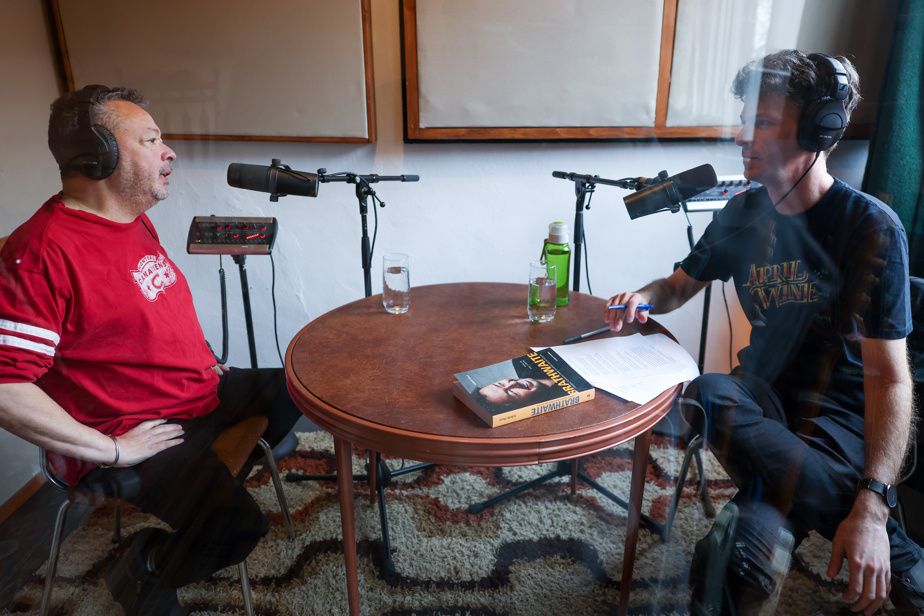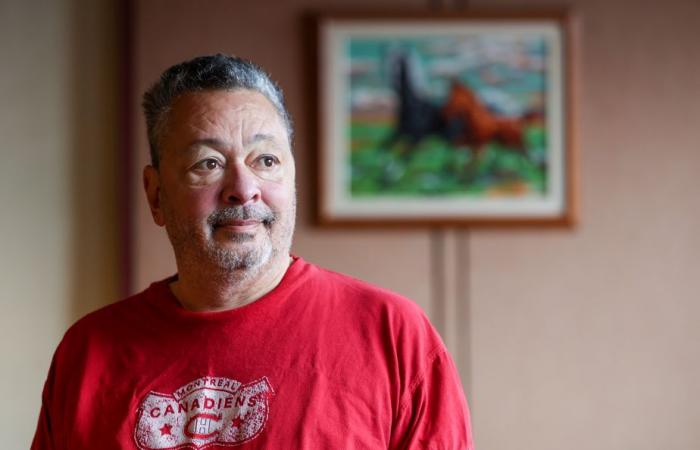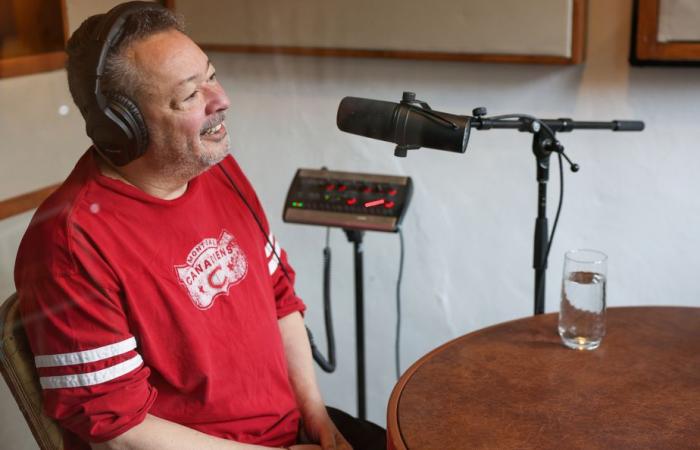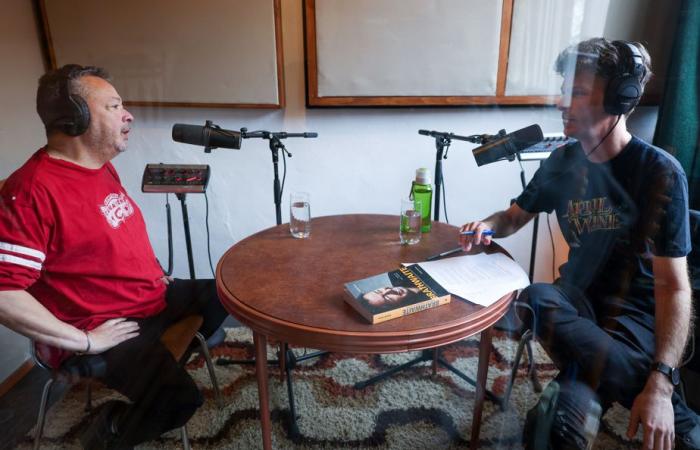In the podcast series Just between you and meartists open the doors to their memories, their reflections and their dreams, for a press-free interview.
Published at 6:00 a.m.
Not long before leaving this world, in 2009, legendary studio guitarist Jean-Marie Benoît sent a letter to Normand Brathwaite to compliment him on his performance on a TV show, where he had accompanied an artist by playing guitar. 'egg. “You’re really part of the rest of us now,” he wrote to her. “Of the rest of us” as in: the restricted circle of real real musicians.
Listen to the full episode
Normand Brathwaite received wheelbarrows full of prizes, shouted “It's hot, it's hot, it's hot” in front of millions of hilarious viewers and long reigned over the mornings of the metropolis, at the microphone of CKOI.
But nothing seems to make him as proud as this kind word from one of the artisans of Quebec popular music of the 1970s and 1980s, who notably accompanied Robert Charlebois, Diane Dufresne and Diane Tell.
It is therefore logical that over the past year, few moments have filled him with such pure fulfillment as when he participated in the shows of one of his musical heroes, Gilles Valiquette.
How does he feel when he is on stage, surrounded by musicians? “I'm just fine. I'm really just, just okay. Much more than when I animate,” simply replies someone for whom fullness is not the most easily accessible state.
Coming full circle, then. In 1973, at Père-Marquette secondary school, in the Petite-Patrie of his childhood, a young Norman played with his friend Bobby Breton as the opening act for the singer who, to see life in rosy terms, does not need of much.
Five decades later, he was invited by the same Valiquette to accompany him on percussion on a new version of What a beautiful dayincluded on his album Back to Songs for Coffeepublished in October 2023. He was certainly not going to refuse to go on tour with him, when his schedule allows it.
PHOTO FRANÇOIS ROY, THE PRESS
Normand Brathwaite, happy to chat about music
It's the most beautiful moment of my life. I'm here and I have in my in-ear [ses moniteurs intra-auriculaires] Monique Fauteux [choriste]Rémi Malo [bassiste]Dominique Messier [batteur]. And it's velvet: Gilles' voice, Gilles' guitars. I'm just happy.
Normand Brathwaite
“Normand has acquired a lot of maturity as a musician over time,” observes Gilles Valiquette, reached by telephone a few days after the recording of our interview with Brathwaite.
“Normand will take the time to listen and find the perfect place to insert himself into the song, with his percussion. It's sure that he's a personality, that it's out of the ordinary that he's there, but all he wants is to be on an equal footing with the other musicians. He has a good ear and that is perhaps the most important thing. »
Step a fuss
To the eyes of a neophyte, there may seem to be nothing more babyish than playing certain small percussion instruments – tambourine, shaker, triangle – which it is fashionable to make fun of. The triangle, “it’s one of the most difficult instruments to play,” insists Normand Brathwaite, who recently celebrated the 500e emissions of Belle and Bum.
“I'm so tired of hearing people say: 'I'm going to play the tom-tom'”, he thunders about this term which he considers “derogatory”, used indiscriminately to describe a djembe, a conga or bongos. A tam-tam is actually an oriental musical instrument, similar to a gong, which has absolutely nothing African or Cuban about it.
There are a lot of animators who think that if you hold a tambourine in your hands, you're a musician, and that really disappoints me. I play the tambourine correctly. But I spent 20 years next to Mélissa Lavergne, who really plays it more than correctly.
Normand Brathwaite
The percussionist, and former co-host of Belle and Bumfor whom his reverence is almost religious, will have conveyed to him the importance of parsimony, of not spreading each song with as many notes as possible.
“There are many artists with whom I have had the chance to play over 22 years of Belle and Bum who are my idols. Just the other time, Claude Dubois was there at the 500e and we did Artiste. I tell you that I rehearsed them, the timpani passes! Because Claude doesn't like it when you add things. We finished the song and he gave me a big smile. » And Normand suddenly breathed much better.
The joke the flattest
When he left the theater school at Lionel-Groulx College, Normand Brathwaite imagined himself “rolling Anne-Marie Provencher in the mud” for the rest of his life, a joke that he would make several times about the actress who he played with in the play Orgasm 1at the Montreal Experimental Theater.

PHOTO FRANÇOIS ROY, THE PRESS
Normand Brathwaite in interview
Instead, he has become one of the busiest men in Quebec showbiz who, at 66, often says « been there, done that » facing new projects. This is why, he confides, he may very well no longer accept other animation contracts, if they do not have a link with music.
After the death of his father in July 1979 – Walter Brathwaite was only 49 years old – Normand “buried himself in work”. And even if a certain fatigue inhabits him today, the man knows that music is life, and that life is movement. No question of retiring, which would be tantamount to letting death set foot in his home.
“I think it’s the flattest joke in the world, someone who dies,” he whispers with a gravity that we don’t know for much of him. “When I go to the Bell Centre, I always say to myself: among everyone here, there is someone whose father, mother or sister died yesterday. And there they are, at a hockey game, probably devastated, but they carry on. »
Holiday Belle and BumDecember 24 at 8 p.m. on Télé-Québec
Three quotes from our interview
About his fear of disappointing
“I don't like meeting people, because I'm always afraid of disappointing them. The other time, I walked into a bar in Quebec, it was full of young machines playing jazz and there was a silence, as if I were someone, when, in terms of performance, 1 to 10, the others are at 10, and I'm at 3. It always makes me laugh. I meet people and there is always a distance. »
About Mélissa Lavergne
“I've seen Mélissa's hands so much that when I'm at a show and I have to play a percussion instrument, I always think for a second about where Mélissa's hands would naturally go. »
About the place of women in music
“The reluctance I had was terrible. It was the time of musicians sitting down, with headphones, and often, on the score, there was a Playboy. […] Now, when I put on a show, I no longer think guy, white, girl, black. I'm just thinking of the right person for the instrument. And most of the time that results in a few more girls than guys. »








